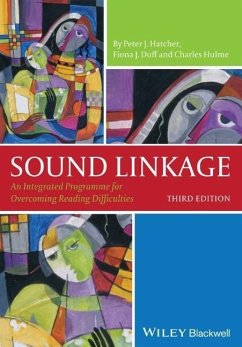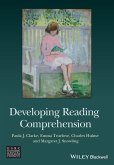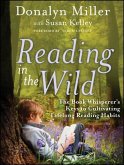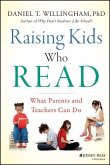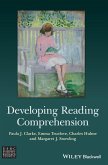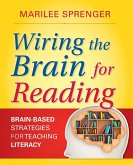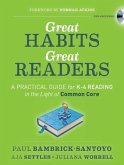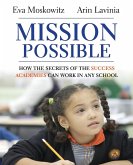Peter J. Hatcher, Fiona J. Duff, Charles Hulme
Sound Linkage
An Integrated Programme for Overcoming Reading Difficulties
Peter J. Hatcher, Fiona J. Duff, Charles Hulme
Sound Linkage
An Integrated Programme for Overcoming Reading Difficulties
- Broschiertes Buch
- Merkliste
- Auf die Merkliste
- Bewerten Bewerten
- Teilen
- Produkt teilen
- Produkterinnerung
- Produkterinnerung
Fully revised to reflect the latest advancements in the field, the third edition of Sound Linkage provides a guide to phonological techniques for improving the reading comprehension skills of students with reading delays and dyslexia. Based in an comprehensive 1994 study performed by the authors and updated research of the last two decades, this manual covers word and syllable identification, identification and supply of rhyming words, identification and discrimination of phonemes, and blending, segmentation, deletion, substitution, and transposition of phonemes within words. Teachers, child…mehr
Andere Kunden interessierten sich auch für
![Developing Reading Comprehension Developing Reading Comprehension]() Paula J. ClarkeDeveloping Reading Comprehension52,99 €
Paula J. ClarkeDeveloping Reading Comprehension52,99 €![Reading in the Wild Reading in the Wild]() Donalyn MillerReading in the Wild25,99 €
Donalyn MillerReading in the Wild25,99 €![Raising Kids Who Read Raising Kids Who Read]() Daniel T. WillinghamRaising Kids Who Read23,99 €
Daniel T. WillinghamRaising Kids Who Read23,99 €![Developing Reading Comprehensi Developing Reading Comprehensi]() Paula J. ClarkeDeveloping Reading Comprehensi127,99 €
Paula J. ClarkeDeveloping Reading Comprehensi127,99 €![Wiring the Brain for Reading Wiring the Brain for Reading]() Marilee B. SprengerWiring the Brain for Reading20,99 €
Marilee B. SprengerWiring the Brain for Reading20,99 €![Great Habits, Great Readers Great Habits, Great Readers]() Paul Bambrick-SantoyoGreat Habits, Great Readers25,99 €
Paul Bambrick-SantoyoGreat Habits, Great Readers25,99 €![Mission Possible Mission Possible]() Eva MoskowitzMission Possible23,99 €
Eva MoskowitzMission Possible23,99 €-
-
-
Fully revised to reflect the latest advancements in the field, the third edition of Sound Linkage provides a guide to phonological techniques for improving the reading comprehension skills of students with reading delays and dyslexia. Based in an comprehensive 1994 study performed by the authors and updated research of the last two decades, this manual covers word and syllable identification, identification and supply of rhyming words, identification and discrimination of phonemes, and blending, segmentation, deletion, substitution, and transposition of phonemes within words. Teachers, child psychologists, and special education needs coordinators will benefit from the book's thorough coverage, photocopiable record sheets, and appendix of additional activities for students.
The updated edition of this successful resource has been developed to support children with reading delays and dyslexia. It contains a phonological training programme, an explanation of how this programme can be embedded within a broader reading intervention, a standardized test of phonological awareness and a methodology to grade children's reading books.
This third edition has been revised throughout to include the latest developments in the field
These resources have been used with a wide range of children and found to be suitable for use with any reading-delayed children, irrespective of cognitive ability and age
All activities are accompanied by a set of photocopiable record sheets, a set of pictures, and an appendix of additional activities useful in helping children master a particular skill or to reinforce existing learning
The ten sections of activities within the guide include: identification of words and syllables; identification and supply of rhyming words; identification and discrimination of phonemes; and blending, segmentation, deletion, substitution and transposition of phonemes within words.
Hinweis: Dieser Artikel kann nur an eine deutsche Lieferadresse ausgeliefert werden.
The updated edition of this successful resource has been developed to support children with reading delays and dyslexia. It contains a phonological training programme, an explanation of how this programme can be embedded within a broader reading intervention, a standardized test of phonological awareness and a methodology to grade children's reading books.
This third edition has been revised throughout to include the latest developments in the field
These resources have been used with a wide range of children and found to be suitable for use with any reading-delayed children, irrespective of cognitive ability and age
All activities are accompanied by a set of photocopiable record sheets, a set of pictures, and an appendix of additional activities useful in helping children master a particular skill or to reinforce existing learning
The ten sections of activities within the guide include: identification of words and syllables; identification and supply of rhyming words; identification and discrimination of phonemes; and blending, segmentation, deletion, substitution and transposition of phonemes within words.
Hinweis: Dieser Artikel kann nur an eine deutsche Lieferadresse ausgeliefert werden.
Produktdetails
- Produktdetails
- Verlag: Wiley & Sons
- 3. Aufl.
- Seitenzahl: 200
- Erscheinungstermin: 7. Mai 2014
- Englisch
- Abmessung: 323mm x 232mm x 31mm
- Gewicht: 956g
- ISBN-13: 9781118510087
- ISBN-10: 1118510089
- Artikelnr.: 40134005
- Herstellerkennzeichnung
- Libri GmbH
- Europaallee 1
- 36244 Bad Hersfeld
- gpsr@libri.de
- Verlag: Wiley & Sons
- 3. Aufl.
- Seitenzahl: 200
- Erscheinungstermin: 7. Mai 2014
- Englisch
- Abmessung: 323mm x 232mm x 31mm
- Gewicht: 956g
- ISBN-13: 9781118510087
- ISBN-10: 1118510089
- Artikelnr.: 40134005
- Herstellerkennzeichnung
- Libri GmbH
- Europaallee 1
- 36244 Bad Hersfeld
- gpsr@libri.de
Peter J. Hatcher was, until his retirement, Senior Lecturer in Psychology at the University of York. He also worked as a Senior Educational Psychologist with the Cumbria Education Authority. His work in the area of understanding and helping children with reading difficulties master the skills of reading, with Charles Hulme and Andrew Ellis, culminated in their groundbreaking research (1994) that supported the Sound Linkage Hypothesis. Prior to working as an Educational Psychologist, he taught primary, secondary and tertiary-age students in special and mainstream settings in Australia, the Bahamas, Sierra Leone and the UK. Fiona J. Duff is a Research Associate at the University of Oxford. She was previously a research fellow at the University of York, where she also completed her PhD. During her studies, she was awarded the British Psychological Society Postgraduate Award and was seconded to the Parliamentary Office of Science and Technology, where she authored a briefing note for parliamentarians on teaching children to read. Charles Hulme is Professor of Psychology at University College London. He is a former Editor-in-Chief of the journal Scientific Studies of Reading and is currently a Senior Editor of the Association of Psychological Science's flagship journal, Psychological Science. His publications include five authored and four edited books, over 190 journal articles, as well as several psychometric tests, including the United Kingdom's new standard test of reading comprehension, the York Assessment of Reading for Comprehension.
Acknowledgements x
Foreword xi
About the companion website xii
Introduction 1
Test of phonological awareness 3
Programme administration 10
Phonological training activities 10
Phonological linkage activities 12
Section 1: Identification of words as units within sentences 15
Activity 1: Introduction to the concepts of 'beginning', 'middle' and 'end'
16
Activity 2: Comprehension of the concepts of 'beginning', 'middle' and
'end' in sentences 16
Activity 3: Transferring the concepts of 'beginning', 'middle' and 'end' to
an aural activity 17
Activity 4: Production of initial, final and medial words in sentences of
two to four words 18
Activity 5: Matching counters to words in sentences of two to five words 19
Section 2: Identification and manipulation of syllables 21
Activity 1: Introduction to syllabic rhythm in poems (A) 22
Activity 2: Introduction to syllabic rhythm in poems (B) 23
Activity 3: Syllable blending (two to four syllables) 24
Activity 4: Introduction to syllable segmentation 25
Activity 5: Segmentation of words into syllables (two to four) 26
Activity 6: Syllable counting in words of two to four syllables 27
Activity 7: Syllable deletion 28
Section 3: Identification and supply of rhyming words 29
Activity 1: Introduction to rhyme 30
Activity 2: Discrimination of pairs of rhyming and non-rhyming words 31
Activity 3: Supplying rhymes (A) 31
Activity 4: Supplying rhymes (B) 32
Activity 5: Supplying rhymes (C) 33
Activity 6: Rhyme supply (riddles) 35
Activity 7: Discrimination of one of three words that rhymes with a target
word 36
Section 4: Identification and discrimination of phonemes 37
Activity 1: Introduction to 'saying a word slowly' 38
Activity 2: Picture sound association (initial sounds of words) 38
Activity 3: Word pair discrimination 39
Activity 4: Identification of initial sounds in words 40
Activity 5: Identification of final sounds in words 42
Activity 6: Identification of medial sounds in words 44
Activity 7: Discrimination of two of three words with the same initial
sound 46
Activity 8: Introduction to the concept of 'same end' sound 47
Activity 9: Discrimination of two of three words with the same final sound
48
Activity 10: Discrimination of two of three words with the same medial
sound 48
Activity 11: Discrimination of word pairs with the same initial sound 49
Activity 12: Discrimination of word pairs with the same final sound 50
Activity 13: Discrimination of word pairs with the same medial sound 51
Activity 14: Discrimination of one of three words with the same initial
sound as a target word 51
Activity 15: Discrimination of one of four words with a different initial
sound 52
Activity 16: Discrimination of one of three words with the same final sound
as a target word 54
Activity 17: Discrimination of one of four words with a different final
sound 55
Section 5: Phoneme blending 57
Activity 1: Production of words from two to four sounds 58
Activity 2: Production of words from two sounds 59
Activity 3: Production of words from three sounds 59
Activity 4: Production of words from four sounds 60
Activity 5: Production of words from five sounds 61
Activity 6: Sound linkage: Blending of two sounds 62
Activity 7: Sound linkage: Blending of three sounds 63
Activity 8: Sound linkage: Blending of four sounds (initial blends) 64
Activity 9: Sound linkage: Blending of four sounds (final blends) 66
Section 6: Phoneme segmentation 69
Activity 1: Production of the initial sound of target words 70
Activity 2: Production of the final sound of target words 70
Activity 3: Production of the medial sound of target words 71
Activity 4: Introduction to the concept of breaking up a word into sounds
72
Activity 5: Introduction to segmenting a word while pushing counters into
boxes 73
Activity 6: Phoneme counting with two to four counters (A) 74
Activity 7: Phoneme counting with two to four counters (B) 75
Activity 8: Segmenting words into sounds 75
Activity 9: Sound linkage: Discrimination of two of three words with the
same initial 'sound' 76
Activity 10: Sound linkage: Discrimination of two of three words with the
same final 'sound' 77
Activity 11: Sound linkage: Discrimination of two of three words with the
same medial 'sound' 79
Section 7: Phoneme deletion 81
Activity 1: Introduction to the concepts of 'missing from' and 'without' 82
Activity 2: Introduction to the concepts of 'taken away' and 'left' in
relation to sounds in words 83
Activity 3: Specification of the initial sound deleted from a word 85
Activity 4: Specification of the final sound deleted from a word 85
Activity 5: Specification of a medial sound that has been deleted from a
word 86
Activity 6: Deletion of the initial sound of a word to produce another word
(A) 87
Activity 7: Deletion of the initial sound of a word to produce another word
(B) 88
Activity 8: Deletion of the final sound of a word to produce another word
89
Activity 9: Deletion of the medial sound of a word to produce another word
89
Activity 10: Sound linkage: Discrimination of a word produced by deleting
the initial sound from a stimulus word 90
Activity 11: Sound linkage: Discrimination of a word produced by deleting
the final sound from a stimulus word 92
Section 8: Phoneme substitution 95
Activity 1: Introduction to the concept of changing the beginning item of a
sequence 96
Activity 2: Revision of the concept of 'first sound in a word' 96
Activity 3: Changing the initial sound of a word 97
Activity 4: Phoneme substitution (initial sound) 98
Activity 5: Phoneme substitution (final sound) 98
Activity 6: Phoneme substitution (medial sound) 99
Activity 7: Sound linkage: Substitution of initial letters/phonemes in
words 100
Activity 8: Sound linkage: Substitution of final letters/phonemes in words
102
Activity 9: Sound linkage: Substitution of medial letters/phonemes in words
103
Section 9: Phoneme transposition 105
Activity 1: Defining the concept of backwards (using pictures) 106
Activity 2: Defining the concept of backwards (in relation to words) 106
Activity 3: Defining the concept of backwards (in relation to sounds in
words) 107
Activity 4: Reversing the sequence of sounds in a word 108
Activity 5: Introduction to spoonerisms 109
Activity 6: Spoonerisms 110
Activity 7: Sound linkage: Reversing the sequence of sounds in a word 111
Activity 8: Sound linkage: Spoonerisms 112
Section 10: Phonological linkage activities 115
Instructions 116
Establishing a link between sounds and the written form of words 116
Using letters as clues in text reading 117
Multisyllabic words and words with suffixes and prefixes 118
Playing with words 118
Sound Linkage: Theoretical background to the programme 120
Phonological awareness and learning to read 120
The Hatcher, Hulme and Ellis study 121
Evidence from subsequent studies for the effectiveness of 'reading with
phonology' programmes 126
Using sound linkage as one component of an integrated approach to teaching
reading 128
Grading children's early reading books 132
Summary 132
Test development and standardisation 133
Appendix 1: Additional activities 142
Section 2: Identification and manipulation of syllables 142
Section 3: Identification and supply of rhyming words 142
Section 4: Identification and discrimination of phonemes 143
Section 5: Phoneme blending 144
Section 6: Phoneme segmentation 145
Section 7: Phoneme deletion 146
Section 8: Phoneme substitution 146
Section 9: Phoneme transposition 146
Appendix 2: Table of percentages (observed score / possible score) × 100
148
Appendix 3: Grading children's early reading books 149
Sound linkage training programme: Record Sheets 156
Record Sheet A: Test of phonological awareness 156
Record Sheet B: Identification of words as units within sentences 158
Record Sheet C: Identification and manipulation of syllables 160
Record Sheet D: Identification and supply of rhyming words 162
Record Sheet E: Identification and discrimination of phonemes 164
Record Sheet F: Phoneme blending 171
Record Sheet G: Phoneme segmentation 174
Record Sheet H: Phoneme deletion 177
Record Sheet I: Phoneme substitution 180
Record Sheet J: Phoneme transposition 183
References and Bibliography 185
Foreword xi
About the companion website xii
Introduction 1
Test of phonological awareness 3
Programme administration 10
Phonological training activities 10
Phonological linkage activities 12
Section 1: Identification of words as units within sentences 15
Activity 1: Introduction to the concepts of 'beginning', 'middle' and 'end'
16
Activity 2: Comprehension of the concepts of 'beginning', 'middle' and
'end' in sentences 16
Activity 3: Transferring the concepts of 'beginning', 'middle' and 'end' to
an aural activity 17
Activity 4: Production of initial, final and medial words in sentences of
two to four words 18
Activity 5: Matching counters to words in sentences of two to five words 19
Section 2: Identification and manipulation of syllables 21
Activity 1: Introduction to syllabic rhythm in poems (A) 22
Activity 2: Introduction to syllabic rhythm in poems (B) 23
Activity 3: Syllable blending (two to four syllables) 24
Activity 4: Introduction to syllable segmentation 25
Activity 5: Segmentation of words into syllables (two to four) 26
Activity 6: Syllable counting in words of two to four syllables 27
Activity 7: Syllable deletion 28
Section 3: Identification and supply of rhyming words 29
Activity 1: Introduction to rhyme 30
Activity 2: Discrimination of pairs of rhyming and non-rhyming words 31
Activity 3: Supplying rhymes (A) 31
Activity 4: Supplying rhymes (B) 32
Activity 5: Supplying rhymes (C) 33
Activity 6: Rhyme supply (riddles) 35
Activity 7: Discrimination of one of three words that rhymes with a target
word 36
Section 4: Identification and discrimination of phonemes 37
Activity 1: Introduction to 'saying a word slowly' 38
Activity 2: Picture sound association (initial sounds of words) 38
Activity 3: Word pair discrimination 39
Activity 4: Identification of initial sounds in words 40
Activity 5: Identification of final sounds in words 42
Activity 6: Identification of medial sounds in words 44
Activity 7: Discrimination of two of three words with the same initial
sound 46
Activity 8: Introduction to the concept of 'same end' sound 47
Activity 9: Discrimination of two of three words with the same final sound
48
Activity 10: Discrimination of two of three words with the same medial
sound 48
Activity 11: Discrimination of word pairs with the same initial sound 49
Activity 12: Discrimination of word pairs with the same final sound 50
Activity 13: Discrimination of word pairs with the same medial sound 51
Activity 14: Discrimination of one of three words with the same initial
sound as a target word 51
Activity 15: Discrimination of one of four words with a different initial
sound 52
Activity 16: Discrimination of one of three words with the same final sound
as a target word 54
Activity 17: Discrimination of one of four words with a different final
sound 55
Section 5: Phoneme blending 57
Activity 1: Production of words from two to four sounds 58
Activity 2: Production of words from two sounds 59
Activity 3: Production of words from three sounds 59
Activity 4: Production of words from four sounds 60
Activity 5: Production of words from five sounds 61
Activity 6: Sound linkage: Blending of two sounds 62
Activity 7: Sound linkage: Blending of three sounds 63
Activity 8: Sound linkage: Blending of four sounds (initial blends) 64
Activity 9: Sound linkage: Blending of four sounds (final blends) 66
Section 6: Phoneme segmentation 69
Activity 1: Production of the initial sound of target words 70
Activity 2: Production of the final sound of target words 70
Activity 3: Production of the medial sound of target words 71
Activity 4: Introduction to the concept of breaking up a word into sounds
72
Activity 5: Introduction to segmenting a word while pushing counters into
boxes 73
Activity 6: Phoneme counting with two to four counters (A) 74
Activity 7: Phoneme counting with two to four counters (B) 75
Activity 8: Segmenting words into sounds 75
Activity 9: Sound linkage: Discrimination of two of three words with the
same initial 'sound' 76
Activity 10: Sound linkage: Discrimination of two of three words with the
same final 'sound' 77
Activity 11: Sound linkage: Discrimination of two of three words with the
same medial 'sound' 79
Section 7: Phoneme deletion 81
Activity 1: Introduction to the concepts of 'missing from' and 'without' 82
Activity 2: Introduction to the concepts of 'taken away' and 'left' in
relation to sounds in words 83
Activity 3: Specification of the initial sound deleted from a word 85
Activity 4: Specification of the final sound deleted from a word 85
Activity 5: Specification of a medial sound that has been deleted from a
word 86
Activity 6: Deletion of the initial sound of a word to produce another word
(A) 87
Activity 7: Deletion of the initial sound of a word to produce another word
(B) 88
Activity 8: Deletion of the final sound of a word to produce another word
89
Activity 9: Deletion of the medial sound of a word to produce another word
89
Activity 10: Sound linkage: Discrimination of a word produced by deleting
the initial sound from a stimulus word 90
Activity 11: Sound linkage: Discrimination of a word produced by deleting
the final sound from a stimulus word 92
Section 8: Phoneme substitution 95
Activity 1: Introduction to the concept of changing the beginning item of a
sequence 96
Activity 2: Revision of the concept of 'first sound in a word' 96
Activity 3: Changing the initial sound of a word 97
Activity 4: Phoneme substitution (initial sound) 98
Activity 5: Phoneme substitution (final sound) 98
Activity 6: Phoneme substitution (medial sound) 99
Activity 7: Sound linkage: Substitution of initial letters/phonemes in
words 100
Activity 8: Sound linkage: Substitution of final letters/phonemes in words
102
Activity 9: Sound linkage: Substitution of medial letters/phonemes in words
103
Section 9: Phoneme transposition 105
Activity 1: Defining the concept of backwards (using pictures) 106
Activity 2: Defining the concept of backwards (in relation to words) 106
Activity 3: Defining the concept of backwards (in relation to sounds in
words) 107
Activity 4: Reversing the sequence of sounds in a word 108
Activity 5: Introduction to spoonerisms 109
Activity 6: Spoonerisms 110
Activity 7: Sound linkage: Reversing the sequence of sounds in a word 111
Activity 8: Sound linkage: Spoonerisms 112
Section 10: Phonological linkage activities 115
Instructions 116
Establishing a link between sounds and the written form of words 116
Using letters as clues in text reading 117
Multisyllabic words and words with suffixes and prefixes 118
Playing with words 118
Sound Linkage: Theoretical background to the programme 120
Phonological awareness and learning to read 120
The Hatcher, Hulme and Ellis study 121
Evidence from subsequent studies for the effectiveness of 'reading with
phonology' programmes 126
Using sound linkage as one component of an integrated approach to teaching
reading 128
Grading children's early reading books 132
Summary 132
Test development and standardisation 133
Appendix 1: Additional activities 142
Section 2: Identification and manipulation of syllables 142
Section 3: Identification and supply of rhyming words 142
Section 4: Identification and discrimination of phonemes 143
Section 5: Phoneme blending 144
Section 6: Phoneme segmentation 145
Section 7: Phoneme deletion 146
Section 8: Phoneme substitution 146
Section 9: Phoneme transposition 146
Appendix 2: Table of percentages (observed score / possible score) × 100
148
Appendix 3: Grading children's early reading books 149
Sound linkage training programme: Record Sheets 156
Record Sheet A: Test of phonological awareness 156
Record Sheet B: Identification of words as units within sentences 158
Record Sheet C: Identification and manipulation of syllables 160
Record Sheet D: Identification and supply of rhyming words 162
Record Sheet E: Identification and discrimination of phonemes 164
Record Sheet F: Phoneme blending 171
Record Sheet G: Phoneme segmentation 174
Record Sheet H: Phoneme deletion 177
Record Sheet I: Phoneme substitution 180
Record Sheet J: Phoneme transposition 183
References and Bibliography 185
Acknowledgements x
Foreword xi
About the companion website xii
Introduction 1
Test of phonological awareness 3
Programme administration 10
Phonological training activities 10
Phonological linkage activities 12
Section 1: Identification of words as units within sentences 15
Activity 1: Introduction to the concepts of 'beginning', 'middle' and 'end'
16
Activity 2: Comprehension of the concepts of 'beginning', 'middle' and
'end' in sentences 16
Activity 3: Transferring the concepts of 'beginning', 'middle' and 'end' to
an aural activity 17
Activity 4: Production of initial, final and medial words in sentences of
two to four words 18
Activity 5: Matching counters to words in sentences of two to five words 19
Section 2: Identification and manipulation of syllables 21
Activity 1: Introduction to syllabic rhythm in poems (A) 22
Activity 2: Introduction to syllabic rhythm in poems (B) 23
Activity 3: Syllable blending (two to four syllables) 24
Activity 4: Introduction to syllable segmentation 25
Activity 5: Segmentation of words into syllables (two to four) 26
Activity 6: Syllable counting in words of two to four syllables 27
Activity 7: Syllable deletion 28
Section 3: Identification and supply of rhyming words 29
Activity 1: Introduction to rhyme 30
Activity 2: Discrimination of pairs of rhyming and non-rhyming words 31
Activity 3: Supplying rhymes (A) 31
Activity 4: Supplying rhymes (B) 32
Activity 5: Supplying rhymes (C) 33
Activity 6: Rhyme supply (riddles) 35
Activity 7: Discrimination of one of three words that rhymes with a target
word 36
Section 4: Identification and discrimination of phonemes 37
Activity 1: Introduction to 'saying a word slowly' 38
Activity 2: Picture sound association (initial sounds of words) 38
Activity 3: Word pair discrimination 39
Activity 4: Identification of initial sounds in words 40
Activity 5: Identification of final sounds in words 42
Activity 6: Identification of medial sounds in words 44
Activity 7: Discrimination of two of three words with the same initial
sound 46
Activity 8: Introduction to the concept of 'same end' sound 47
Activity 9: Discrimination of two of three words with the same final sound
48
Activity 10: Discrimination of two of three words with the same medial
sound 48
Activity 11: Discrimination of word pairs with the same initial sound 49
Activity 12: Discrimination of word pairs with the same final sound 50
Activity 13: Discrimination of word pairs with the same medial sound 51
Activity 14: Discrimination of one of three words with the same initial
sound as a target word 51
Activity 15: Discrimination of one of four words with a different initial
sound 52
Activity 16: Discrimination of one of three words with the same final sound
as a target word 54
Activity 17: Discrimination of one of four words with a different final
sound 55
Section 5: Phoneme blending 57
Activity 1: Production of words from two to four sounds 58
Activity 2: Production of words from two sounds 59
Activity 3: Production of words from three sounds 59
Activity 4: Production of words from four sounds 60
Activity 5: Production of words from five sounds 61
Activity 6: Sound linkage: Blending of two sounds 62
Activity 7: Sound linkage: Blending of three sounds 63
Activity 8: Sound linkage: Blending of four sounds (initial blends) 64
Activity 9: Sound linkage: Blending of four sounds (final blends) 66
Section 6: Phoneme segmentation 69
Activity 1: Production of the initial sound of target words 70
Activity 2: Production of the final sound of target words 70
Activity 3: Production of the medial sound of target words 71
Activity 4: Introduction to the concept of breaking up a word into sounds
72
Activity 5: Introduction to segmenting a word while pushing counters into
boxes 73
Activity 6: Phoneme counting with two to four counters (A) 74
Activity 7: Phoneme counting with two to four counters (B) 75
Activity 8: Segmenting words into sounds 75
Activity 9: Sound linkage: Discrimination of two of three words with the
same initial 'sound' 76
Activity 10: Sound linkage: Discrimination of two of three words with the
same final 'sound' 77
Activity 11: Sound linkage: Discrimination of two of three words with the
same medial 'sound' 79
Section 7: Phoneme deletion 81
Activity 1: Introduction to the concepts of 'missing from' and 'without' 82
Activity 2: Introduction to the concepts of 'taken away' and 'left' in
relation to sounds in words 83
Activity 3: Specification of the initial sound deleted from a word 85
Activity 4: Specification of the final sound deleted from a word 85
Activity 5: Specification of a medial sound that has been deleted from a
word 86
Activity 6: Deletion of the initial sound of a word to produce another word
(A) 87
Activity 7: Deletion of the initial sound of a word to produce another word
(B) 88
Activity 8: Deletion of the final sound of a word to produce another word
89
Activity 9: Deletion of the medial sound of a word to produce another word
89
Activity 10: Sound linkage: Discrimination of a word produced by deleting
the initial sound from a stimulus word 90
Activity 11: Sound linkage: Discrimination of a word produced by deleting
the final sound from a stimulus word 92
Section 8: Phoneme substitution 95
Activity 1: Introduction to the concept of changing the beginning item of a
sequence 96
Activity 2: Revision of the concept of 'first sound in a word' 96
Activity 3: Changing the initial sound of a word 97
Activity 4: Phoneme substitution (initial sound) 98
Activity 5: Phoneme substitution (final sound) 98
Activity 6: Phoneme substitution (medial sound) 99
Activity 7: Sound linkage: Substitution of initial letters/phonemes in
words 100
Activity 8: Sound linkage: Substitution of final letters/phonemes in words
102
Activity 9: Sound linkage: Substitution of medial letters/phonemes in words
103
Section 9: Phoneme transposition 105
Activity 1: Defining the concept of backwards (using pictures) 106
Activity 2: Defining the concept of backwards (in relation to words) 106
Activity 3: Defining the concept of backwards (in relation to sounds in
words) 107
Activity 4: Reversing the sequence of sounds in a word 108
Activity 5: Introduction to spoonerisms 109
Activity 6: Spoonerisms 110
Activity 7: Sound linkage: Reversing the sequence of sounds in a word 111
Activity 8: Sound linkage: Spoonerisms 112
Section 10: Phonological linkage activities 115
Instructions 116
Establishing a link between sounds and the written form of words 116
Using letters as clues in text reading 117
Multisyllabic words and words with suffixes and prefixes 118
Playing with words 118
Sound Linkage: Theoretical background to the programme 120
Phonological awareness and learning to read 120
The Hatcher, Hulme and Ellis study 121
Evidence from subsequent studies for the effectiveness of 'reading with
phonology' programmes 126
Using sound linkage as one component of an integrated approach to teaching
reading 128
Grading children's early reading books 132
Summary 132
Test development and standardisation 133
Appendix 1: Additional activities 142
Section 2: Identification and manipulation of syllables 142
Section 3: Identification and supply of rhyming words 142
Section 4: Identification and discrimination of phonemes 143
Section 5: Phoneme blending 144
Section 6: Phoneme segmentation 145
Section 7: Phoneme deletion 146
Section 8: Phoneme substitution 146
Section 9: Phoneme transposition 146
Appendix 2: Table of percentages (observed score / possible score) × 100
148
Appendix 3: Grading children's early reading books 149
Sound linkage training programme: Record Sheets 156
Record Sheet A: Test of phonological awareness 156
Record Sheet B: Identification of words as units within sentences 158
Record Sheet C: Identification and manipulation of syllables 160
Record Sheet D: Identification and supply of rhyming words 162
Record Sheet E: Identification and discrimination of phonemes 164
Record Sheet F: Phoneme blending 171
Record Sheet G: Phoneme segmentation 174
Record Sheet H: Phoneme deletion 177
Record Sheet I: Phoneme substitution 180
Record Sheet J: Phoneme transposition 183
References and Bibliography 185
Foreword xi
About the companion website xii
Introduction 1
Test of phonological awareness 3
Programme administration 10
Phonological training activities 10
Phonological linkage activities 12
Section 1: Identification of words as units within sentences 15
Activity 1: Introduction to the concepts of 'beginning', 'middle' and 'end'
16
Activity 2: Comprehension of the concepts of 'beginning', 'middle' and
'end' in sentences 16
Activity 3: Transferring the concepts of 'beginning', 'middle' and 'end' to
an aural activity 17
Activity 4: Production of initial, final and medial words in sentences of
two to four words 18
Activity 5: Matching counters to words in sentences of two to five words 19
Section 2: Identification and manipulation of syllables 21
Activity 1: Introduction to syllabic rhythm in poems (A) 22
Activity 2: Introduction to syllabic rhythm in poems (B) 23
Activity 3: Syllable blending (two to four syllables) 24
Activity 4: Introduction to syllable segmentation 25
Activity 5: Segmentation of words into syllables (two to four) 26
Activity 6: Syllable counting in words of two to four syllables 27
Activity 7: Syllable deletion 28
Section 3: Identification and supply of rhyming words 29
Activity 1: Introduction to rhyme 30
Activity 2: Discrimination of pairs of rhyming and non-rhyming words 31
Activity 3: Supplying rhymes (A) 31
Activity 4: Supplying rhymes (B) 32
Activity 5: Supplying rhymes (C) 33
Activity 6: Rhyme supply (riddles) 35
Activity 7: Discrimination of one of three words that rhymes with a target
word 36
Section 4: Identification and discrimination of phonemes 37
Activity 1: Introduction to 'saying a word slowly' 38
Activity 2: Picture sound association (initial sounds of words) 38
Activity 3: Word pair discrimination 39
Activity 4: Identification of initial sounds in words 40
Activity 5: Identification of final sounds in words 42
Activity 6: Identification of medial sounds in words 44
Activity 7: Discrimination of two of three words with the same initial
sound 46
Activity 8: Introduction to the concept of 'same end' sound 47
Activity 9: Discrimination of two of three words with the same final sound
48
Activity 10: Discrimination of two of three words with the same medial
sound 48
Activity 11: Discrimination of word pairs with the same initial sound 49
Activity 12: Discrimination of word pairs with the same final sound 50
Activity 13: Discrimination of word pairs with the same medial sound 51
Activity 14: Discrimination of one of three words with the same initial
sound as a target word 51
Activity 15: Discrimination of one of four words with a different initial
sound 52
Activity 16: Discrimination of one of three words with the same final sound
as a target word 54
Activity 17: Discrimination of one of four words with a different final
sound 55
Section 5: Phoneme blending 57
Activity 1: Production of words from two to four sounds 58
Activity 2: Production of words from two sounds 59
Activity 3: Production of words from three sounds 59
Activity 4: Production of words from four sounds 60
Activity 5: Production of words from five sounds 61
Activity 6: Sound linkage: Blending of two sounds 62
Activity 7: Sound linkage: Blending of three sounds 63
Activity 8: Sound linkage: Blending of four sounds (initial blends) 64
Activity 9: Sound linkage: Blending of four sounds (final blends) 66
Section 6: Phoneme segmentation 69
Activity 1: Production of the initial sound of target words 70
Activity 2: Production of the final sound of target words 70
Activity 3: Production of the medial sound of target words 71
Activity 4: Introduction to the concept of breaking up a word into sounds
72
Activity 5: Introduction to segmenting a word while pushing counters into
boxes 73
Activity 6: Phoneme counting with two to four counters (A) 74
Activity 7: Phoneme counting with two to four counters (B) 75
Activity 8: Segmenting words into sounds 75
Activity 9: Sound linkage: Discrimination of two of three words with the
same initial 'sound' 76
Activity 10: Sound linkage: Discrimination of two of three words with the
same final 'sound' 77
Activity 11: Sound linkage: Discrimination of two of three words with the
same medial 'sound' 79
Section 7: Phoneme deletion 81
Activity 1: Introduction to the concepts of 'missing from' and 'without' 82
Activity 2: Introduction to the concepts of 'taken away' and 'left' in
relation to sounds in words 83
Activity 3: Specification of the initial sound deleted from a word 85
Activity 4: Specification of the final sound deleted from a word 85
Activity 5: Specification of a medial sound that has been deleted from a
word 86
Activity 6: Deletion of the initial sound of a word to produce another word
(A) 87
Activity 7: Deletion of the initial sound of a word to produce another word
(B) 88
Activity 8: Deletion of the final sound of a word to produce another word
89
Activity 9: Deletion of the medial sound of a word to produce another word
89
Activity 10: Sound linkage: Discrimination of a word produced by deleting
the initial sound from a stimulus word 90
Activity 11: Sound linkage: Discrimination of a word produced by deleting
the final sound from a stimulus word 92
Section 8: Phoneme substitution 95
Activity 1: Introduction to the concept of changing the beginning item of a
sequence 96
Activity 2: Revision of the concept of 'first sound in a word' 96
Activity 3: Changing the initial sound of a word 97
Activity 4: Phoneme substitution (initial sound) 98
Activity 5: Phoneme substitution (final sound) 98
Activity 6: Phoneme substitution (medial sound) 99
Activity 7: Sound linkage: Substitution of initial letters/phonemes in
words 100
Activity 8: Sound linkage: Substitution of final letters/phonemes in words
102
Activity 9: Sound linkage: Substitution of medial letters/phonemes in words
103
Section 9: Phoneme transposition 105
Activity 1: Defining the concept of backwards (using pictures) 106
Activity 2: Defining the concept of backwards (in relation to words) 106
Activity 3: Defining the concept of backwards (in relation to sounds in
words) 107
Activity 4: Reversing the sequence of sounds in a word 108
Activity 5: Introduction to spoonerisms 109
Activity 6: Spoonerisms 110
Activity 7: Sound linkage: Reversing the sequence of sounds in a word 111
Activity 8: Sound linkage: Spoonerisms 112
Section 10: Phonological linkage activities 115
Instructions 116
Establishing a link between sounds and the written form of words 116
Using letters as clues in text reading 117
Multisyllabic words and words with suffixes and prefixes 118
Playing with words 118
Sound Linkage: Theoretical background to the programme 120
Phonological awareness and learning to read 120
The Hatcher, Hulme and Ellis study 121
Evidence from subsequent studies for the effectiveness of 'reading with
phonology' programmes 126
Using sound linkage as one component of an integrated approach to teaching
reading 128
Grading children's early reading books 132
Summary 132
Test development and standardisation 133
Appendix 1: Additional activities 142
Section 2: Identification and manipulation of syllables 142
Section 3: Identification and supply of rhyming words 142
Section 4: Identification and discrimination of phonemes 143
Section 5: Phoneme blending 144
Section 6: Phoneme segmentation 145
Section 7: Phoneme deletion 146
Section 8: Phoneme substitution 146
Section 9: Phoneme transposition 146
Appendix 2: Table of percentages (observed score / possible score) × 100
148
Appendix 3: Grading children's early reading books 149
Sound linkage training programme: Record Sheets 156
Record Sheet A: Test of phonological awareness 156
Record Sheet B: Identification of words as units within sentences 158
Record Sheet C: Identification and manipulation of syllables 160
Record Sheet D: Identification and supply of rhyming words 162
Record Sheet E: Identification and discrimination of phonemes 164
Record Sheet F: Phoneme blending 171
Record Sheet G: Phoneme segmentation 174
Record Sheet H: Phoneme deletion 177
Record Sheet I: Phoneme substitution 180
Record Sheet J: Phoneme transposition 183
References and Bibliography 185

